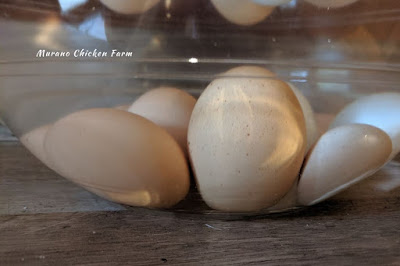The float test.
The egg float test is pretty simple and works well since eggs change as they age. A brand new egg has a certain amount of space in the air cell. As the egg ages the pores of the egg allow air to enter and the air cell gets larger. The larger the air cell the more buoyant the egg. In shorter terms, old eggs float.
How to do the egg float test
To do the float test you just need a glass or bowl of water and an egg of questionable age. Fill the glass 3/4 of the way with room temperature water. Add the egg gently, pointed side down.
If the egg sinks to the bottom and lays on its side, it's less than a week old
If the egg sits on the bottom but stands on it's end, it's about 2 weeks old
If the egg floats completely then it's old enough that it's probably best to throw it out or cook it for the chickens.
As you can see from these bowls of eggs of various ages, the ones laying on their sides on the bottom of the bowl are fresh. The ones standing up are a few weeks old. The ones floating are over 4 weeks old and no longer considered fresh.
But what does this mean? I thought we could eat farm fresh eggs for months after they were laid?
How long do eggs last?
Well technically even the eggs that float aren't actually 'bad'. Unless they've been contaminated they have not really gone bad, but rather their nutritional content has deteriorated. You may notice a difference in texture or thickness, but you can still eat them if you want.
According to food safety rules from the CDC, all eggs should be cooked until both the white and yolk are firm. This prevents the spread of salmonella. Keep in mind that it doesn't matter if the egg is fresh or older, if you eat an under cooked egg that contains the salmonella bacteria you will get sick.
Eggs do age faster sitting on the kitchen counter than they do in the refrigerator though. Cold also inhibits the growth of any bacteria that may be present.
According to Incredible egg, eggs last about 4-5 weeks when refrigerated. Keeping eggs at 40°F or below is the optimal storage temperature. If you keep your eggs on the counter, consume or refrigerate them by 3 weeks old.
Water removes the bloom
Unfortunately, because we soaked the egg with water the bloom has become compromised. I don't like to say removed (unless you rubbed the eggs dry with a towel) because it's not quite gone, but it has started to be removed.
For food safety you'll want to immediately refrigerate all the eggs you keep from your float test and use them as soon as possible.
This test can be used on all eggs regardless if you've bought them at the grocery store or if your chickens laid them. It's important to note that while this can give you an approximate age of the egg, this is not an indication of whether the egg is safe to eat or not.
For this reason you should always crack questionable eggs into a separate bowl, then add it the your recipe or pan after you have checked it out visually.
Eggs tend to lose their 'shape' as they age. Well, I mean the shell stays the same...but once out of the shell there are visual differences between fresh and older eggs. The white tends to be thinner and spread out in a larger area in an older egg. The yolk is less firm and instead of sitting up slightly rounded, it tends to be flatter.
False results from the float test
In certain situations you can get an egg that doesn't float but when you open it, it's not edible. An egg that has been incubated only a few days won't float but it's not something most people would eat. If an egg started to go bad soon after it was laid (bacteria entered through a small crack) it may not float, but would be inedible.
More great reasons to crack the egg into a bowl before cooking it!
You can also try sniffing the egg before cracking. A rotten egg will give off a particularly undeniable stench. Of course, if the egg has only recently started to go bad it could take a few days for this to permeate the shell. This is another good reason to crack the egg into a bowl before using.
Once opened if there is a smell, it will be more obvious.
While the float test can help you to identify which eggs are older than others, you don't want to use it exclusively to gauge the edibility of an egg. Use common sense, crack it into a bowl, take a good look at it and smell the egg before using it.
Want to know more about raising chickens? Click here for my most read chicken keeping articles!
~L
Want information on raising chickens sent right to your email weekly? Click right here to join my list and get new posts sent directly to you the day they're published ... plus, you'll also get the free download '25 Ways to save money raising chickens'.





Great info, Lisa! Thanks for sharing on Farm Fresh Tuesdays!
ReplyDeleteHi i found 8 eggs and i think they are not good because a hen was with them . How i know they are good or hatched
ReplyDeleteHold a flashlight up to them and see if you can see anything inside the egg. If a chick is developing you should be able to tell after day 3.
DeleteLisa